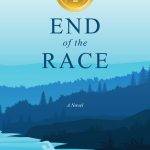I’m now proud to announce that END OF THE RACE will be in print as of Monday, May 3rd. After all of the blog discussion of polarization, culture wars, and social change, it’s time to refocus on the central theme of this book. By 2007, the cleavage of right from left was a done deal. The Sixties upheavals that had split the Wolfson brothers had become “a mutual contempt that had grown old, soft and fuzzy around the edges,” (p. 20), though Tom Berglund’s hatred of the Wolfsons remained virulent as ever. But this is not their story. Tom’s daughter, Annika, and Karl Wolfson’s son, Brian, live in a different world:
They had no use, back then, for the quarrels that split the adults, creating barricades and forbidden territories; they lived for water, woods and wind. Always racing for a place beyond (p. 5).
This is the story of the powerful bond swimming and that race for the beyond gave the pair:
“If you’re fast enough,” Uncle Joe agreed. “I tell you what. Let’s see you race Brian to …” he gazed about, “… to that buoy off the headland.” He pointed. “You can dive off the dock.”
“Right. Come on, Annie.”
She’d never raced when it mattered, but Brian seemed to fill her with air. They collided at the buoy, exploding in laughter.
That was the beginning. The day she’d discovered she could fly (p. 58).
For Annika, swimming was the escape from a family ruled by her father’s PTSD. For Brian, it was a place he could excel without comparison to his older brother. Together, they were invincible, and when Brian was injured and could no longer compete, he slid into the role of coach, and the bond drove them onward:
Annika gazed down the row of red sweatshirts, The Dolphins blazing in white, white legs with red stripes, all waiting, waiting, and felt their adrenaline pumping in her veins.
“Okay, Annie, you’re on!”
She leapt from the bench at Joe’s shout and headed for the blocks as the announcer’s voice echoed, “200 meter freestyle!”
She pulled on her cap and goggles, then stretched and spread her arms, taking Brian’s wind into her lungs along with her own. It was a ritual now. They’d done it ever since they’d won their first heats.
“Take your marks …”
She stepped onto the starting block,
“Set …”
She crouched, her arms stretched behind her ready to swing …
The gun boomed.
She swung her arms, her body following, barely cutting the surface of the water, then began to stroke, picking up the momentum of the dive, her mind riveted to the end of the pool, the moment to curl for the turn, push. She was ahead. The air from many victories lifted her, the feel of water rushing past. And again …
Her cheering team filled her ears the last meters before her hand touched the wall, and her mind released its hold. Brian was jumping up and down, holding her sweatshirt. The nationals. She’d won the nationals (p. 6)!
In Annika’s voice and in Brian’s, we feel the exultation of the race, of victory, and feel the bond that carries them into marriage and parenthood. As all of this unfolds, the split between their parents remains:
How could a family so given to flying apart remain so stuck together? It was as though the world had split in the Sixties, and she and Brian, each bonded to one side and drawn to the other, were fated to cobble, or re-cobble, it together again—or live on a tightrope between the two (p. 54).
As Annika searches for her missing half, she engages more and more with the world beyond the swimming pool and becomes more and more uneasy about the race itself and about the role of the Wolfsons in Brian’s disappearance. But the fragments refuse to fall into place—until a family explosion reveals the missing piece.
Every reader will find a different story in END OF THE RACE, and that’s as it should be. For some, it’s the unraveling of a mysterious disappearance and coping with unexplained absence. For another, it’s the power of the race, of victory, the gold, for another the split world that shapes Annika’s and Brian’s lives. And always, dim and in the background, there’s the head of the Wolfsons, “Papa’” hope for reconciliation and reunion:
She [Annika]also knew him[Papa] as an old man who held his family together with the force of his personality. At his annual Labor Day picnic, just past, his rugged sun-baked jaw had clamped as he perused his family, sitting at separate tables on the wide lawn, his wife Melissa moving from one group to the other, denying the split. “Okay Joe! Karl! Time to see if you can still race those crates down there!” He did it every year, and every year, for an hour, Joe and Karl became kids again, chasing each in their old dinghies with yells and jeers and laughter. And on shore Papa drew Melissa close and watched, the house’s glassed-in porches glittering in the sun behind them. Now she could hear the sound of a mower, probably Papa himself, from the wide lawn between the house and the lake (p. 50).
As of Monday, May 3rd, END OF THE RACE will be available in e-book and print at Amazon, Barnes & Noble, Kobe, and from the BookBaby Store and my website. It will also be in local libraries soon.


Comments are closed.